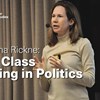universe
Universal procreation rights and future generations
Journal of Applied Philosophy Abstract It is often acknowledged that public policies can constrain people’s procreative opportunities, in some cases even infringing their procreative rights. However, a
Successful and failed episodes of democratization: conceptualization, identication, and description
Varieties of Democracy Institute: Working Paper No. 97. Abstract What explains successful democratization? This paper makes four contributions towards providing more sophisticated answers to this questishowing that while several established covariates are useful for predicting outcomes, none of them seem to explain the onset of a period of liberalization. Fourth, it illustrates how the identification of episodes makes it possible to study processes quantitatively using sequencing methods to detail the importance of the order of change for liberalization outcomes.
“I just want to be the friendly face of national socialism” The turn to civility in the cultural expressions of neo-Nazism in Sweden
in: Nordicom Review, Volume 42: Issue S1This article is based on a case study of the media narratives of the neo-Nazi organisation Nordic Resistance Movement (NRM) and situates this particular actor w
Women in the Nordic Resistance Movement and their online media practices: between internalised misogyny and “embedded feminism”
Feminist Media Studies Abstract This paper is based on a case study of the online media practices of the neo-Nazi organisation, the Nordic Resistance Movement,conducted in the context of an ongoing proje
Research seminar with Johanna Rickne: The Class Ceiling in Politics
Venue: Institutet för framtidsstudier, Holländargatan 13, 4th floor, Stockholm, or online.Research seminar with Johanna Rickne, professor of Economics at SOFI, Stockholm University.Register hereAbstracPrior studies have documented that working-class individuals rarely become parliamentarians. We know less about when in the career pipeline to parliament workers disappear, and why. We study these questions using detailed data on the universe of Swedish politicians’ careers over a 50-year period. We find roughly equal-sized declines in the proportion of workers on various rungs of the political career ladder ranging from local to national office. We reject the potential explanations that workers lack political ambition, public service motivation, honesty, or voter support. And while workers’ average high school grades and cognitive test scores are lower, this cannot explain their large promotion disadvantage, a situation that we label a class ceiling. Organizational ties to blue-collar unions help workers advance, but only to lower-level positions in left-leaning parties. We conclude that efforts to improve workers’ numerical representation should apply throughout the career ladder and focus on intra-party processes.

Johanna Rickne: The Class Ceiling in Politics
Research seminar with Johanna Rickne, professor of Economics at SOFI, Stockholm University Abstract: Prior studies have documented that working-class individuals rarely become parliamentarians. We kno
Natuschka Lee: Mars and the Earthlings – A Realistic View on Mars Exploration and Settlement
Venue: Institute for Futures Studies, Holländargatan 13 in Stockholm or online Research seminar with Natuschka Lee,microbiologist and an astrobiologist, with a PhD degree in Biotechnology from Lund Univ
Torsten Persson: Who Becomes a Politician?
Torsten Persson is Professor of Economics at Institute for International Economic Studies, Stockholm University. ABSTRACT Can a democracy attract competent leaders, while attaining broad representation?

Solidarity in diverse societies - interview with Will Kymlicka
Will Kymlicka, researcher of political philosophy, came to visit the Institute for Futures Studies in Stockholm in April 2016, thanks to funding from The Swedish Foundation for Humanities and Social S

Solidarity in diverse societies - interview with Will Kymlicka
Will Kymlicka, researcher in political philosophy, is interviewed by Gustaf Arrhenius, director of the Institute for Futures Studies in Stockholm. The topic is multiculturalism and the welfare state.








